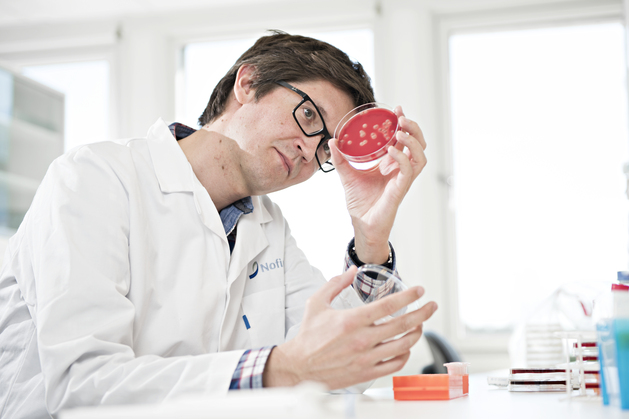NatBiom
Enhanced fish performance and biosecurity by manipulation of the natural microbiome of Atlantic salmon

This study investigates how the natural microbiome of Atlantic salmon may be used to enhance fish performance and welfare.
Start
03. Jan 2023
End
31. Dec 2024
Funded by
FHF – Norwegian Seafood Research Fund
Cooperation
UiT The Arctic University of Norway, University of Gothenburg, Sweden
Project Manager(s):
Other Participants:
Lene Sveen
Aleksei Krasnov
Gerrit Timmerhaus
Elisabeth Ytteborg
Background
Ulcer development caused by the “winter ulcer disease” associated with the bacteria Moritella viscosa and “tenacibaculosis” associated with Tenacibaculum spp. is a challenge in Norwegian salmon farming.
From previous characterisation studies, we have found different types of bacteria on the skin. In this project, these bacteria will be better characterised, and studies will investigate how they are able to influence the skin’s development, barrier functions and responses against skin pathogenic bacteria like M. viscosa and Tenacibaculum.
The purpose is to strengthen the skin’s properties and thus increase welfare, health and performance during the early phases at sea.
In the final part of the project, infection models and trials on how the fish respond to environmental changes will be carried out to document the effect on general robustness and ulcer development.
Goal
The main objective is to enhance the fish performance and biosecurity by manipulating the natural microbiome of Atlantic salmon.
What we do
Nofima is leading the project and will build on previous knowledge about the microbial biogeography of Atlantic salmon skin. Bacterial isolates will be characterised based on bacteria-bacteria interaction, growth conditions and phenotypic properties, as well as functional genome analyses that will form the basis for the further progress of the project.
Cell models developed from salmon skin will be used to identify cellular responses and how these change with different types of bacterial exposure.
Some of the bacteria will be further used to document how exposure affects the performance of fish when transferred to sea during falling seawater temperatures and the effect of exposure to the ulcer causing bacterium Moritella viscosa. Bacterial community analyses of fish and the environment will also be carried out from material obtained from the trials.
The data will contribute to a more holistic interpretation, correlating effects between the host and the environmental microbiome, and how this interacts with the skin and possibly affects barrier functions linked to fish health.
Nofima will participate in the work on bacterial characterisation, and is also responsible for the work involving cell models and implementation of infection and field trials with analyses of the fish.
UiT The Arctic University of Norway will conduct functional genome analyses and metagenomic analyses from the trial set-ups.
The team from the University of Gothenburg is conducting bacterial binding studies and characterisation of skin mucus and skin barrier functions.
Research areas
Farmed fish
Files and Links